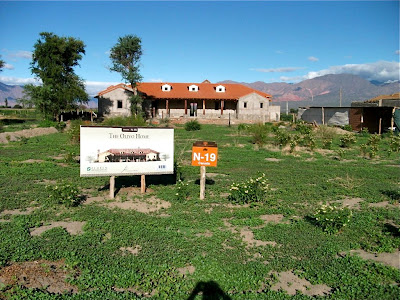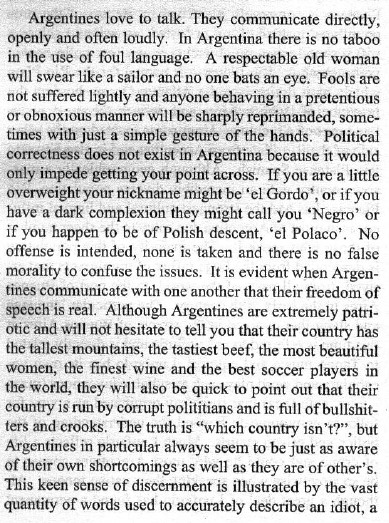[from
Bloomberg, 25 January 2011, thank you to Steve Abramowitz]
Argentina Lures Bankers Dreaming of Owning Their Own VineyardFor his 50th birthday two years ago, Phil Asmundson, vice chairman of technology at Deloitte LLP, flew to Argentina for a vacation and ended up buying a vineyard.
As a long-time wine collector, making his own was a secret dream. During harvest in March or April, he'll fly down from New York to pick malbec grapes and play cellar rat.
Asmundson bought 3 acres of land in the Uco Valley for just under $200,000 from Vines of Mendoza, a five-year-old company in Argentina that sells parcels of prime vineyard acreage, plants them to owners' specifications, then manages caretaking and winemaking. Owners can participate as much or as little as they wish. The 87 so far come from 7 states and 9 countries.
"There aren't many passions that are made easy to do," says Asmundson. "This was turnkey."
The other deciding factors? He loves the country's signature malbec grape, and was persuaded that the wines could be "really great quality" because Vines of Mendoza has the help of well-known winemaker Santiago Achaval.
When the deal was final, he and his wife celebrated with bottles of Salentein Primus malbec ($45) from Argentina and Heitz Trailside cabernet ($80) from Napa.
Vines of Mendoza sent him a case of unmarked wines to taste, and used his notes to help focus the style of wine he wanted to make.
Luxury Resort
On a freezing December day, I caught up on the latest developments with co-founder Michael Evans, 45, bronzed from days in vineyard sun, at Manhattan's Topaz Thai restaurant. Over a spicy salad lunch, he clicked through drawings on his laptop of the company's new luxury resort, opening in 2012, where vineyard owners like Asmundson can stay while playing vintner, and tourists can be part of the wine lifestyle.
Lots of glass, local stone, a tiny wine blending lab, courses on Argentine wines—it looked like ambitious high-end Napa with South American cowhide flair and a breathtaking snowcapped Andes backdrop. What started in 2005 as a way for Evans, now 45, to afford his personal vineyard-owning dream has expanded into a range of ventures.
"I alternated between working in wireless technology and politics, but was also passionate about wine," he said.
Exhausted by the John Kerry presidential campaign, he was vacationing in Argentina when he was introduced to Pablo Gimenez Riili by a bookseller in Buenos Aires. The two became business partners and in 2006, after looking at 76 pieces of land, they settled on 1,000 acres accessible only by horseback in the Uco Valley south of the city of Mendoza, near top wineries Bodegas Salentein and Clos de la Siete.
Financial Crash
They ran up credit card debt and tapped friends, family, and angels for $5 million in costs and $500,000 in legal fees, and started offering 3 to 18-acre parcels in 2007. More than 50 of the total 100 sold quickly, but all stalled in 2008.
"You don't know how hard it is to sell a $200,000 vineyard when the financial world is crashing," Evans said. In 2010, though, they unloaded another 25. Planting 1.3 million vines, building a winery, and more has cost another $15 million.
There are hundreds of wineries in the Mendoza region, but on my first trip in 2001, there was no wine bar in Mendoza city where you could taste the best. So Vines of Mendoza opened The Tasting Room in March 2007, then a retail shop and wine bar in the city's Park Hyatt hotel in 2008. They started a wine club, with a warehouse in Napa and recently added a downloadable insider's guide to the region on the Vines of Mendoza website.
Mid-Life Crisis
Judging from the emails I receive, the owning-a-vineyard fantasy is especially popular among wine lovers in midlife crisis mode looking for a life-change. There are now dozens of projects catering to them.
In Oregon wine country near McMinnville is just-launched Hyland Vineyard Estates, a 154-acre project where winemaker Laurent Montalieu is offering homesites with already planted vines he'll manage for $700,000 to more than $1 million. Planned communities of home-plus-vineyard are also being sold in Portugal's Alentejo and France's Languedoc regions.
Evans sent me a barrel sample of Vines of Mendoza's first wine, a blend of owners' malbec grapes, that will be released in March. It was smooth and balanced with lots of dark fruit and earth flavors, though it certainly wasn't the best Argentine malbec I've had.
"It's not only people with 3,000 bottle cellars who buy, says Evans. "These are investment bankers, doctors looking for participatory vacations." And, of course the chance to make wine they'd like to put their name on.
Restaurateur Puck
They also include restaurateur Wolfgang Puck and a Napa vintner. London-based Nick Smith originally bought in for investment but says owning his 3 acres has turned him into passionate wine buff.
Just after Christmas I received a holiday e-mail from Evans, who was back home in Mendoza with his chocolate Labrador, throwing meat on the grill for friends at his regular Sunday asados. He sent a beautiful photo of sunrise over the company's vineyards in Mendoza. Outside my door was a foot of snow.
I remembered a comment from Asmundson, whose wine, from bought grapes, is now in barrel and will be bottled in 2012 in time to serve at Thanksgiving.
"When I think about my vineyard, I smile," he said. "I just wish I'd bought 5 acres."






































